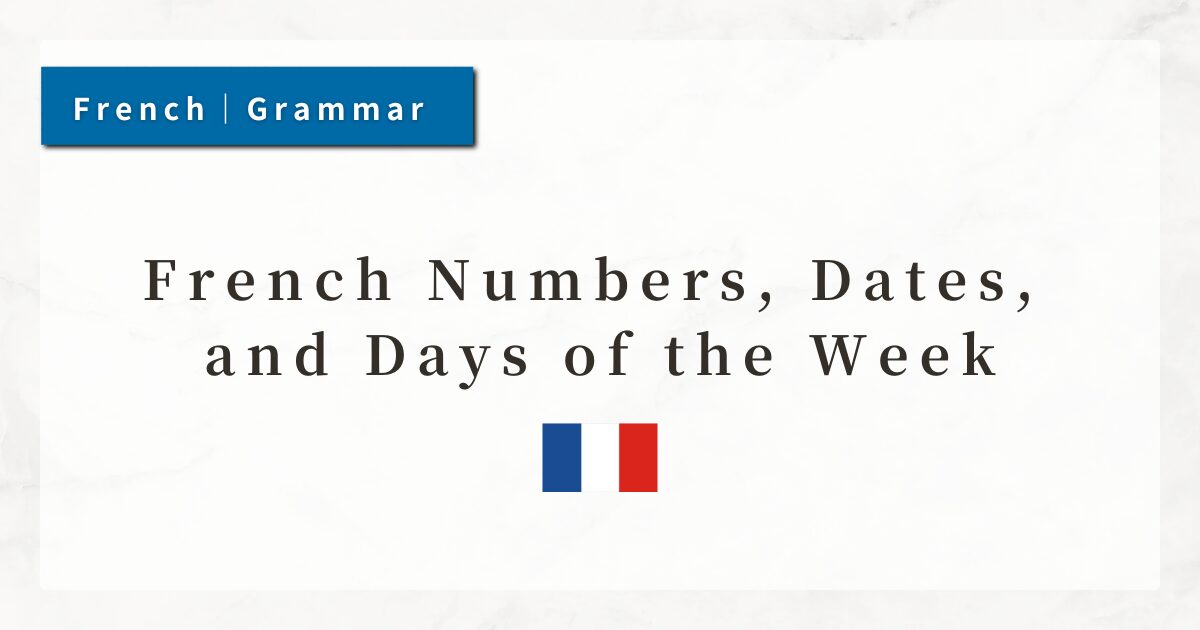#17 French Numbers, Dates, and Days of the Week | Basic Expressions with Examples

When learning French, numbers, dates, and days of the week are unavoidable.
These expressions are essential in everyday conversation: introducing yourself, confirming schedules, stating your age, or celebrating birthdays.
In this lesson, I will explain the basics of numbers, the grammatical rules for expressing dates and days, and how to use them naturally in conversation.
1. Basics of Numbers, Dates, and Days
1-1. Numbers
When learning numbers in French, it is important to firmly memorize the forms from 1 to 20.
Since spelling and pronunciation do not always match, learners often get confused in listening and writing. Therefore, it is effective to learn them both visually and aurally.
From 21 onward, numbers combine as in vingt et un (21) or vingt-deux (22). However, the focus of this lesson is to master numbers up to 20.
| Number | French |
|---|---|
| 1 | un |
| 2 | deux |
| 3 | trois |
| 4 | quatre |
| 5 | cinq |
| 6 | six |
| 7 | sept |
| 8 | huit |
| 9 | neuf |
| 10 | dix |
| 11 | onze |
| 12 | douze |
| 13 | treize |
| 14 | quatorze |
| 15 | quinze |
| 16 | seize |
| 17 | dix-sept |
| 18 | dix-huit |
| 19 | dix-neuf |
| 20 | vingt |
1-2. Days of the Week
Days of the week are essential vocabulary in daily use. Unlike English, the initial letter is lowercase unless at the beginning of a sentence.
In French, all days of the week are treated as masculine nouns.
| French | English |
|---|---|
| lundi | Monday |
| mardi | Tuesday |
| mercredi | Wednesday |
| jeudi | Thursday |
| vendredi | Friday |
| samedi | Saturday |
| dimanche | Sunday |
1-3. Months and Dates
Dates in French are expressed in the order “day → month → year.” Only the first day of the month uses the ordinal (premier).
All other days use cardinal numbers. Month names, like days of the week, are written in lowercase except at the beginning of a sentence.
- le premier janvier
(January 1st) - le 2 février
(February 2nd) - le 14 juillet
(July 14th)
| Month | French |
|---|---|
| January | janvier |
| February | février |
| March | mars |
| April | avril |
| May | mai |
| June | juin |
| July | juillet |
| August | août |
| September | septembre |
| October | octobre |
| November | novembre |
| December | décembre |
2. Using Articles with Days of the Week
In French, a day of the week may appear with or without an article, depending on the meaning.
- Without article (a single occurrence)
→ Je vais à Paris mardi.
(I am going to Paris on Tuesday.) - With article (habitual action)
→ Je vais à Paris le mardi.
(I go to Paris on Tuesdays / every Tuesday.)
Thus, “le + day of the week” expresses a recurring event (“every 〜 day”).
3. Numbers and Age Expressions
When stating age in French, the verb avoir (to have) is used, not être (to be) as in English.
- avoir + number + ans
- J’ai 30 ans.
(I am 30 years old.) - Elle a 18 ans.
(She is 18 years old.)
4. Summary
- Days of the week generally appear without an article, but “le + day” indicates a habitual action.
- Dates are expressed as “le + number + month”, with the exception of the 1st day (le premier).
- Age is expressed using the structure “avoir + number + ans.”
- Days and months are written in lowercase, except at the beginning of a sentence.




